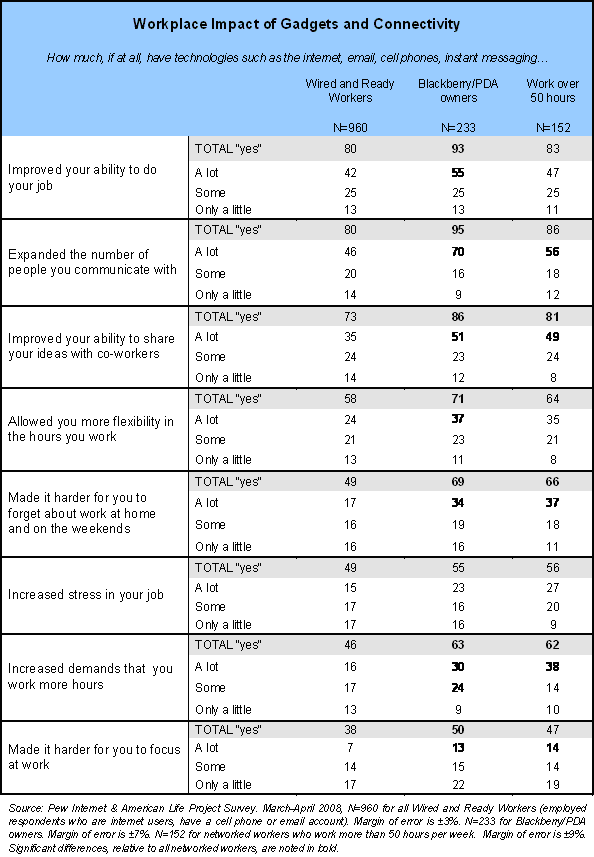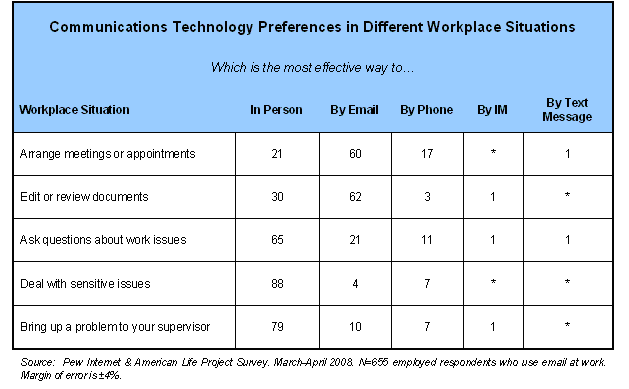Introduction
Today’s workers clearly recognize the benefits of increased connectivity and flexibility that the internet and all of their various gadgets afford them on the job. The overwhelming majority of Wired and Ready Workers say that the internet, email, cell phones and instant messaging have improved their ability to do their job (80%), improved their ability to share ideas with co-workers (73%) and allowed them more flexibility in the hours they work (58%). In addition, 80% of Wired and Ready Workers report that these tech tools have expanded the number of people they communicate with.
Wired and Ready Workers: The 96% of employed adults who are in some way making use of new communications technologies—either by going online, using email or owning a cell phone.
Mobile gadget users who own a Blackberry or PDA are even more likely to note some of these positive effects: that the internet, email, cell phones and instant messaging have improved their ability to do their job (93% overall and 55% “a lot”) and improved their ability to share ideas with co-workers (86% overall and 51% “a lot”). Nearly all Blackberry and PDA owners (95%) feel that new communications technologies have expanded the number of people they communicate with and 70% feel as though these technologies have expanded their network “a lot.”
However, America’s busiest workers—particularly those in professional and managerial roles—also acknowledge the tradeoffs that come with increased connectivity. Many of these workers feel as though access to all of these technologies increases demands that they work more hours, increases the level of stress in their job, and makes it harder for them to disconnect from their work when they’re at home or on the weekends.
Many say technology helps them at work, but also has prompted more demands and expectations that they should work more hours.
When asked how much, if at all, technologies such as the internet, email, cell phones, and instant messaging have increased demands that they work more hours, 46% of all Wired and Ready Workers say they feel those demands have intensified, with 16% saying they have increased “a lot.” Looking specifically at those who work in professional and managerial positions, 59% say these demands have increased, as do 56% of those who work more than 40 hours per week. Of those who work more than 50 hours per week, fully 62% say that these demands have increased, with 38% saying the expectation that they work more hours has increased “a lot.” Those who own Blackberries and PDAs are also an acutely affected group; 63% feel as though gadgets and connectivity increase demands that they work more hours, and 30% feel as though these demands have increased “a lot.”
Looking at age-related differences, younger workers under the age of 50 are generally more likely than older users to feel that new communications technologies have increased expectations that they will work more hours. For instance, 21% of Wired and Ready Workers ages 18-29 say that the internet, email, cell phones and instant messaging have increased these demands “a lot,” while just 11% of those 50-64 note the same.
Many of the nation’s busiest workers attribute increases in stress levels to the information and communication technologies in their lives.
In 2002, the Pew Internet Project asked work emailers how much, if at all, using email at work had added new sources of stress to their job. At the time, 6% said work email had added “a lot” of new stress, while 38% attributed at least a small increase in their stress level at work to email.
We asked a similar, yet broader, question this year and half of all Wired and Ready Workers (49%) say that technologies such as the internet, email, cell phones and instant messaging have had the effect of increasing the level of stress in their job. At one extreme, 15% say these technologies have increased the amount of stress for them “a lot,” while 17% report “some” increase and another 17% say their stress level has increased only “a little” due to their connectivity.
However, among those who work over 50 hours per week, 56% say that information and communication technologies have increased their stress level, with fully 27% saying it has increased “a lot.” Similarly, 58% of those in professional and managerial positions note an increase, but just 18% say that stress in their job has increased “a lot.”
Unlike the findings related to demands for working more hours, younger workers were no more likely than older users to report increased levels of stress due to the use of communications technologies. Similarly, those who work overtime (41-50 hours per week) and those who own a Blackberry or PDA are no more likely than the average user to report heightened stress.
Blackberry and PDA users appreciate the flexibility their connectivity affords, but are among the most likely to find it harder to forget about work at home and on the weekends.
Most Wired and Ready Workers (58%) say that new communications technologies have afforded them more flexibility in the hours they work; 24% feel as though technologies such as the internet, email, cell phones and instant messaging have allowed them “a lot” more flexibility, while 21% say it has afforded them “some” added leeway. Just 13% report that they have “only a little” more flexibility than they did before.
However, Blackberry and PDA users are far more likely than the average Wired and Ready Worker to point to the flexibility factor when talking about the impact of communications technologies. Fully 71% note an increase in flexibility, with 37% saying it has increased “a lot.”
Yet, for many employees, one of the tradeoffs for having more leeway in one’s schedule has been the blurring of work hours and off-work personal time. Noting this compromise, half of Wired and Ready Workers (49%) say that the internet, email, cell phones and instant messaging make it harder for them to forget about their work at home and on the weekends.
Again, Blackberry and PDA users stand out in this regard. More than two-thirds of these gadget owners (69%) feel that new communications technologies have made it harder for them to disconnect from work at home and on the weekends and one-third (34%) feel as though it has become “a lot” harder to do so.
Those who work lots of extra hours report similar impressions; 66% of Wired and Ready Workers clocking in 50 or more hours per week note that new communications technologies have made it harder for them to forget about work, while 37% say it has become “a lot” harder to disconnect from their job at home and on the weekends.
Looking at age, those ages 30-49 are the most likely to say they have problems disconnecting fully from work; 20% of Wired and Ready Workers in this group say new communications technologies have made it “a lot” harder to forget about work at home and on the weekends, while just 12% of those ages 50-64 report the same.
Some find that new communications technologies make it harder to focus at work.
The constant ping of email appearing in our inboxes, voicemails arriving on our cell phones and instant messaging windows beckoning for our attention have presented new challenges for today’s workers. Yet, just 38% of Wired and Ready Workers say that technologies such as the internet, email, cell phones and instant messaging have made it harder for them to focus at work. Few report big impacts in this regard; just 7% say these technologies have made it “a lot” harder to focus, while 14% report “some” impact and 17% say they have made it “only a little” bit harder to focus.
Those who own a Blackberry or PDA are somewhat more likely to report problems focusing at work; half say they have a harder time, while 13% say that new communications technologies have made it “a lot” harder to focus at work. Younger workers under the age of 50 are generally more likely than older users to attribute problems focusing at work to the impact of new communications technologies. However, even among young adults, this is a minority view; just 39% feel as though all of their connectivity and gadgets have made it harder to focus, while 13% say these technologies have made it “a lot” harder to focus at work.
In-person communication is still preferred for many workplace interactions.
While email is the medium of choice for logistics, planning and document review-related work, employed email users still express clear preferences for in-person communication when it comes to coping with questions about work, dealing with sensitive issues or bringing up problems to a supervisor. Modest segments of these workers prefer to use the phone for arranging meetings or appointments, or asking questions about work; however, instant messaging and text messaging were not seen by respondents as effective ways to deal with any of the scenarios posed to them.
Those who express a preference for arranging meetings and appointments or for editing and reviewing documents by email are far more likely than the average worker to express strong views that tech tools have improved their ability to do their job; 58% who favor email feel as though technologies such as the internet, email, cell phones and instant messaging have improved their ability to do their job “a lot,” compared with 42% of all Wired and Ready Workers.






